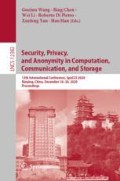Abstract
Federated learning becomes popular for it can train an excellent performance global model without exposing clients’ privacy. However, most FL applications failed to consider there exists fake local trained models returned from attackers or dishonest users. Not only would the fake parameters be harmful to the convergence of the global model but also be wasting of other users’ computational resources. In this paper, we propose a framework to grade the users’ credit score based on the performances of the returned local models on the testing dataset. We also consider historical data using the exponential moving average to give a relatively higher weight for the most recent testing results. The experiments show that our system can efficiently and effectively find out the fake local models and then speed up the convergence of the global model.
Access this chapter
Tax calculation will be finalised at checkout
Purchases are for personal use only
References
Li, K., Lu, G., Luo, G., Cai, Z.: Seed-free graph de-anonymiztiation with adversarial learning. In: Proceedings of the 29th ACM International Conference on Information & Knowledge Management, pp. 745–754 (2020)
Liang, Y., Cai, Z., Yu, J., Han, Q., Li, Y.: Deep learning based inference of private information using embedded sensors in smart devices. IEEE Netw. 32(4), 8–14 (2018)
Liu, Y., et al.: Federated forest. IEEE Trans. Big Data (2020)
De Hert, P., Papakonstantinou, V., Malgieri, G., Beslay, L., Sanchez, I.: The right to data portability in the GDPR: towards user-centric interoperability of digital services. Comput. Law Secur. Rev. 34(2), 193–203 (2018)
Zheng, X., Cai, Z., Li, Y.: Data linkage in smart internet of things systems: a consideration from a privacy perspective. IEEE Commun. Mag. 56(9), 55–61 (2018)
McMahan, B., Moore, E., Ramage, D., Hampson, S., Arcas, B.A.: Communication-efficient learning of deep networks from decentralized data. In: Artificial Intelligence and Statistics, pp. 1273–1282. PMLR (2017)
Cai, Z., He, Z., Guan, X., Li, Y.: Collective data-sanitization for preventing sensitive information inference attacks in social networks. IEEE Trans. Dependable Secure Comput. 15(4), 577–590 (2018)
Cai, Z., Zheng, X.: A private and efficient mechanism for data uploading in smart cyber-physical systems. IEEE Trans. Netw. Sci. Eng. 7(2), 766–775 (2020)
He, Z., Cai, Z., Yu, J.: Latent-data privacy preserving with customized data utility for social network data. IEEE Trans. Veh. Technol. 67(1), 665–673 (2018)
Zheng, X., Cai, Z.: Privacy-preserved data sharing towards multiple parties in industrial IoTs. IEEE J. Sel. Areas Commun. 38(5), 968–979 (2020)
Zhu, H., Jin, Y.: Multi-objective evolutionary federated learning. IEEE trans. Neural Netw. Learn. Syst. 31(4), 1310–1322 (2019)
Zhuo, H.H., Feng, W., Xu, Q., Yang, Q., Lin, Y.: Federated reinforcement learning. arXiv preprint arXiv:1901.08277 (2019)
Pang, J., Huang, Y., Xie, Z., Han, Q., Cai, Z.: Realizing the heterogeneity: a self- organized federated learning framework for IoT. IEEE Internet Things J. (2020)
Smith, V., Chiang, C.-K., Sanjabi, M., Talwalkar, A.S.: Federated multi-task learning. In: Advances in Neural Information Processing Systems, pp. 4424–4434 (2017)
Kang, J., Xiong, Z., Niyato, D., Zou, Y., Zhang, Y., Guizani, M.: Reliable federated learning for mobile networks. IEEE Wirel. Commun. 27(2), 72–80 (2020)
Li, T., Sanjabi, M., Smith, V.: Fair resource allocation in federated learning. ArXiv abs/1905.10497 (2020)
Klinker, F.: Exponential moving average versus moving exponential average. Mathematische Semesterberichte 58(1), 97–107 (2011)
LeCun, Y., Bottou, L., Bengio, Y., Haffner, P.: Gradient-based learning applied to document recognition. Proc. IEEE 86(11), 2278–2324 (1998)
Krizhevsky, A., Sutskever, I., Hinton, G.E.: Imagenet classification with deep convolutional neural networks. Commun. ACM 60(6), 84–90 (2017)
Acknowledgments
This research is supported, in part, by the SunTrust Fellowship Grant (ST20-07).
Author information
Authors and Affiliations
Corresponding author
Editor information
Editors and Affiliations
Rights and permissions
Copyright information
© 2021 Springer Nature Switzerland AG
About this paper
Cite this paper
Zhao, F., Huang, Y., Zhu, S., Malladi, V., Wu, Y. (2021). A Weighted Federated Averaging Framework to Reduce the Negative Influence from the Dishonest Users. In: Wang, G., Chen, B., Li, W., Di Pietro, R., Yan, X., Han, H. (eds) Security, Privacy, and Anonymity in Computation, Communication, and Storage. SpaCCS 2020. Lecture Notes in Computer Science(), vol 12382. Springer, Cham. https://doi.org/10.1007/978-3-030-68851-6_17
Download citation
DOI: https://doi.org/10.1007/978-3-030-68851-6_17
Published:
Publisher Name: Springer, Cham
Print ISBN: 978-3-030-68850-9
Online ISBN: 978-3-030-68851-6
eBook Packages: Computer ScienceComputer Science (R0)

